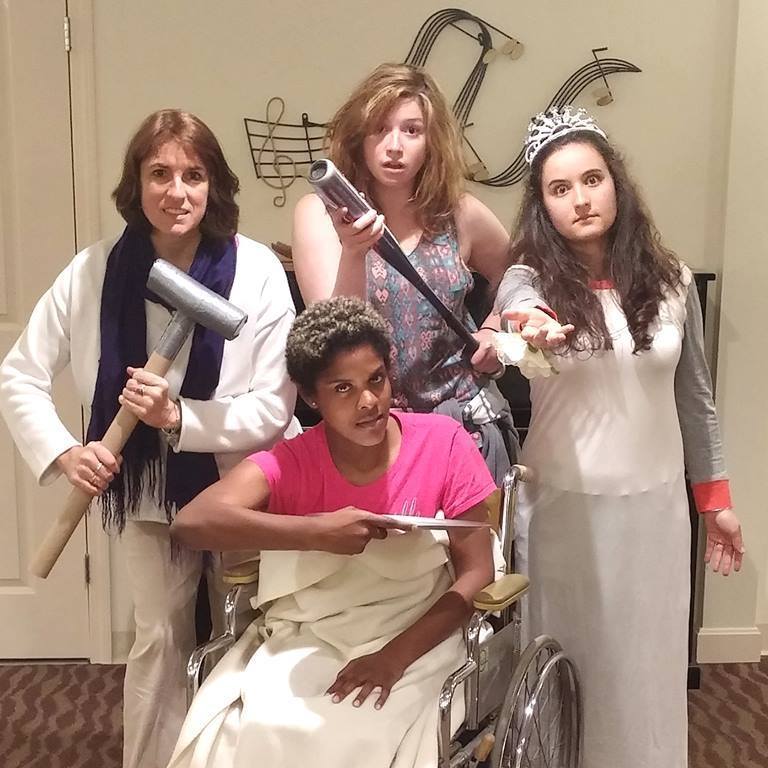A year ago I graduated from The University of Iowa with an MFA in Directing (wtf Time??). While there I directed eight full productions, and school provided me with rehearsal and performance space, a built-in audience, and many fellow students eager to collaborate. It was, I realize now, LUXURIOUS.
With 5 week rehearsal periods, I was able to use rehearsals as a playground. I could go into a rehearsal (occasionally) with no plan and no pre-staging, and trust that if things were disorganized because of this, I could make up for it later (plus those were rehearsals were usually awesome.)
Arcadia rehearsal, October 2015, University production.
Now that I'm back in the 'real world' of indie theater, that freedom of time is gone. I'm sure in the next year or two I'll find my way back to full productions (it looks like I'll have two coming up this fall and winter) - but my first year post-grad school was packed with small shows and events, and VERY short rehearsal schedules. Here's some highlights:
Strong Female Character the Musical by Marianne Pillsbury.
1. Strong Female Character the Musical by Marianne Pillsbury (June 2016, Portland Fringe Festival)
2. A staged reading of O'Neil Finalist Daisy Violet and the Bitch Beast King by Sam Collier and Second Stage 2 (August 2016)
3. A staged reading of Shelter by Jack Horton Gilbert (The Navigators August 2016)
4. Two short Operas at Hartford Opera Theater's New in November festival (Nov 2016)
5. Two performances with Astoria Performing Arts Center's Playmaking Program, one as actor and one as director (February and April 2017),
6. A staged reading of Judith Leora's I'm a Seahorse as part of New York Madness (April 2017)
7. A workshop production of Poe Play by Mark Cole, starring John Smiley (The Navigators May 2017)
APAC's Playmaking Program, photos by Neal Kowalsky.
These were/are all GREAT experiences, with fantastic people. The upside to shorter projects is you can do more of them, and meet more people. The downside is you have to work FAST - which is something I'm not naturally comfortable with or used to. This pace expanded my skill set as a director of full-length plays in a number of ways:
- Preparation: It isn't possible to go into a two hour rehearsal for a 20 minute opera without a plan, and a plan for that plan. For all these projects I had to be prepped down to the minute, knowing there would be very little time to discover choices organically in rehearsal. This honed my prioritization, objectives, and focus with prep in larger productions as well.
- Flexibility: Despite all those hours of prep, shiz happens, and obvi you gotta go with the flow. If an actor is a half-hour late to an hour rehearsal - find ways to be productive until then! If the big idea you have for an actor to walk up a bunch of stairs while singing an aria actually isn't possible with the physiology of human breath - work with the actor to find a better way! Even if a plan I had was precious to me, if it wasn't going to work, I had to let it go and connect to the present moment with a clear mind to find new solutions. Prep, but be ready to work in the room. Hang on tightly, let go loosely. This applies not only to full productions, but to LIFE.
- Imperfections: With a disproportionately short time to rehearse, there is NO way to avoid questionable staging, and acting coaching you could have done over a long rehearsal process sometimes has to be abandoned entirely. This year gave me great practice watching moments I wished could have been better - then accepting that actually, it was no big deal. In any production, we do the best we can in the time we have. And maybe those moments of imperfections are actually more truthful, more lifelike? Chaos and Order and all that.
- You gotta prove yourself: When you're in the pressure cooker, hired to accomplish a job in a small amount of time, you not only have to DO this job, you have to do it as a consummate professional. It may tempting to lay down and crie when the composer adds a new, really long song to the end of the musical and you have one rehearsal left before opening, and you find out about it in front of the actors and producers (did not happen to me YET), but you gotta throw on the 'ole Neutral Face, breath a little, smile, and tell the composer that this is exactly what the show needed. Not only is professionalism the best thing to do as a human, it's what makes producers really want to work with you in the end.
What have y'all learned from your short plays, directors?



